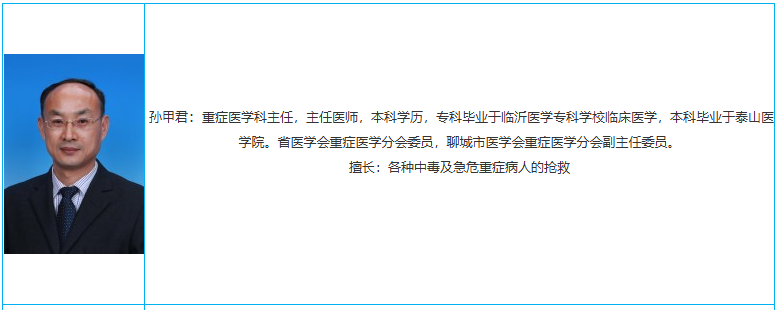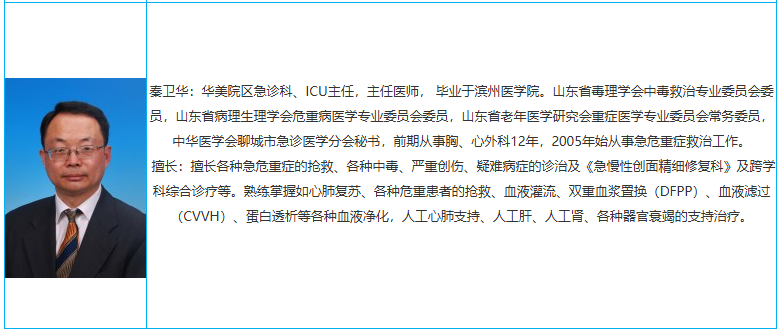- Date:2020-01-08
The Department of Intensive Care Medicine (ICU) of Liaocheng Second People's Hospital was established in October 2005, which is a modernised and closed ICU, belonging to the first grade of the hospital and under the direct jurisdiction of the Department of Medical Affairs, with the name of the department in Chinese as ‘Department of Critical Care Diseases’, which was unified and renamed as ‘Department of Intensive Care Medicine’ in 2009. In 2009, the name of the department was changed to ‘Department of Critical Care Medicine’. It is a specialised department for admitting and treating critically ill patients and conducting advanced resuscitation, centralised treatment and guardianship for critically ill patients, and it is a specialised department for centralised guardianship and rescue of critically ill patients in the hospital.
ICU department initially set up 7 beds, expanded to 24 beds in January 2012, the scope of admission and treatment for: 1. various causes of acute organ failure that endangers the life of patients, such as respiratory failure, heart failure, shock, liver failure, renal failure, diffuse intravascular coagulation, cardiac arrest; 2. general anaesthesia surgery patients' postoperative recovery and various high-risk patients through ICU to strengthen the monitoring and treatment can reduce the risk of death; 3. the ICU is a special unit for intensive care and rescue of critically ill patients, which is a professional department of the hospital. The postoperative recovery of general anaesthesia surgery patients and various high-risk patients can reduce the risk of death through ICU intensive monitoring and treatment; 3. Acute exacerbation of chronic organ insufficiency can be restored to its original state through ICU intensive monitoring and treatment; 4. Patients with advanced malignant tumour do not belong to the scope of ICU admission in principle.
At present, ICU has 24 sets of Myriad central monitoring system and bedside imported Phillip's monitors, 1 set of mobile transport monitor, 24 sets of imported invasive and non-invasive ventilators, including 4 sets of ventilators with transport function; 2 sets of imported bedside haemofiltration machines (one each of B/BRAUN Diapact CRRT and BAXTER Acqurius), 1 set of fibreoptic bronchoscopy, 1 set of Flotrac/Vigileo and 1 set of Fibrofiberscope, and 1 set of Fibrofiberscope, and 1 set of Fibrofiberscope. 1 set of Flotrac/Vigileo cardiac output monitor, 1 set of MAQUET extracorporeal membrane pulmonary oxygenation (ECMO) artificial heart-lung centrifuge, 1 medical cooling blanket, 2 bedside glucose meters, 1 set of Radiometer ABL800 blood gas analyser, 3 sets of vibrating sputum expectorator, 46 sets of micro-syringe pumps, 5 sets of nutrient infusion pumps, 2 sets of infusion pumps, 2 bedside electrocardiograms, etc., and other advanced medical equipment. As well as central air-conditioning, air purification ward, central oxygen supply, central compressed air, central suction, mobile check-up and other advanced facilities, a high-specification mobile ICU (equipped with ventilators, monitors, defibrillators, negative pressure suction, micro pumps, infusion pumps, etc.) was set up in 2015, which facilitates the transportation of emergency and first aid of the peripheral patients with acute and critical illnesses.
In addition to continuous and dynamic vital signs monitoring, dynamic acid-base balance blood gas analysis monitoring, liver function monitoring, renal function monitoring, blood glucose monitoring, immune function monitoring, and nutritional status monitoring for all kinds of critical patients, the Department of Intensive Care Medicine is also capable of invasive arterial blood pressure monitoring, central venous pressure monitoring, and cardiac output monitoring, and tissue oxygen delivery monitoring for those critical patients who have the need to be monitored. Through these dynamic and quantitative monitoring, instantaneous changes in the patient are captured, and according to the changes, targeted therapeutic measures are taken to provide effective treatment and care for critically ill patients. Physicians at all levels are skilled in performing various kinds of arterial and venous puncture and intubation, rapid and skilled tracheal intubation, intubation difficulties through fibreoptic bronchoscopy intubation and fibreoptic bronchoscopy deep sputum suctioning, alveolar lavage, and doctors and nurses have strong emergency response ability, and are able to respond quickly and accurately to all kinds of emergencies as well as all kinds of changes of the patients. They are skilled in applying various invasive and non-invasive mechanical ventilation techniques to treat patients with mechanical ventilation, and applying blood purification techniques (including continuous bedside haemofiltration, haemoperfusion, plasma exchange, double plasma molecular adsorption DPMAS) to treat patients with various kinds of renal failure, hepatic failure, and various kinds of acute poisoning.
There are 19 physicians in ICU: 11 full-time physicians (including 1 chief physician, 1 deputy chief physician, 5 attending physicians) and 8 others; 60 nurses, including 7 competent nurses.
Department Tel: 0635-2366021





 鲁ICP备11009722号-4
鲁ICP备11009722号-4 